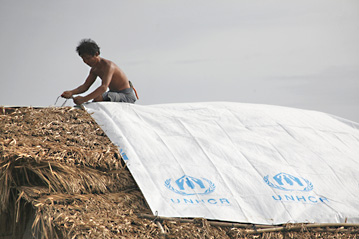When a plastic sheet means more than shelter
When a plastic sheet means more than shelter

LAPUTTA, Myanmar, June 6 (UNHCR) - It's been a month since Cyclone Nargis killed her parents and two daughters. Ma Shwe is back in her village of Kan Gyi Su in Myanmar's Irrawaddy Delta. Sheltered under a UNHCR plastic sheet, she is struggling to make sense of the past and look to the future.
"On the day of the tragic cyclone, I was in another village with my husband to sell the paddy," said the 43-year-old farmer, referring to the rice they grew in the delta, often called Myanmar's rice bowl. She left her three children with her parents at home. When she tried to rush back, the boat was overturned by the huge waves. She lost consciousness and was rescued by her husband.
After the cyclone passed, they took a small boat back to their village. "I found the lifeless, soaked bodies of my parents and two daughters lying in a small boat," said Ma Shwe. "My son had a 50-50 chance of hope. A moment later, unbelievably, someone shouted - my son was limping slowly into the village."
They survived on coconuts for a few days before being taken with other survivors to the nearest town of Laputta. The area was one of the worst-hit during the cyclone of May 2-3. This is where the UN refugee agency has set up one of its two field units - the other is in neighbouring Bogale - to monitor aid distribution and assess needs on the ground.
As part of joint efforts to respond to the emergency, UNHCR has so far airlifted and trucked in more than 430 tonnes of relief items to the affected areas. They include plastic sheets, blankets, mosquito nets and kitchen sets. Another two flights are expected to bring some 74 tonnes of plastic rolls next week.
UNHCR's partners are distributing these emergency shelter and household items in the delta and affected areas around the main city of Yangon.
Ma Shwe and her family recently returned home. "We decided to restart our lives in our village where my family is buried. We can't do anything for a living except farm work," she explained.
The family received UNHCR plastic sheets by boat on the day of their return. One is enough for the three of them, she said, "so no worries for temporary shelter."
Having a roof over her head allows Ma Shwe to focus on the future, including plans to send her son back to school next year. Asked what she needs to resume her life, she said: "It's a long list for a family with no money, no property, no house. Specifically, our immediate need is the capital to reinvest in my farm."
Although many people cannot yet return to their villages, it is everyone's hope that the country's rice bowl will soon be able to rise from the ruins and teem with life again.








